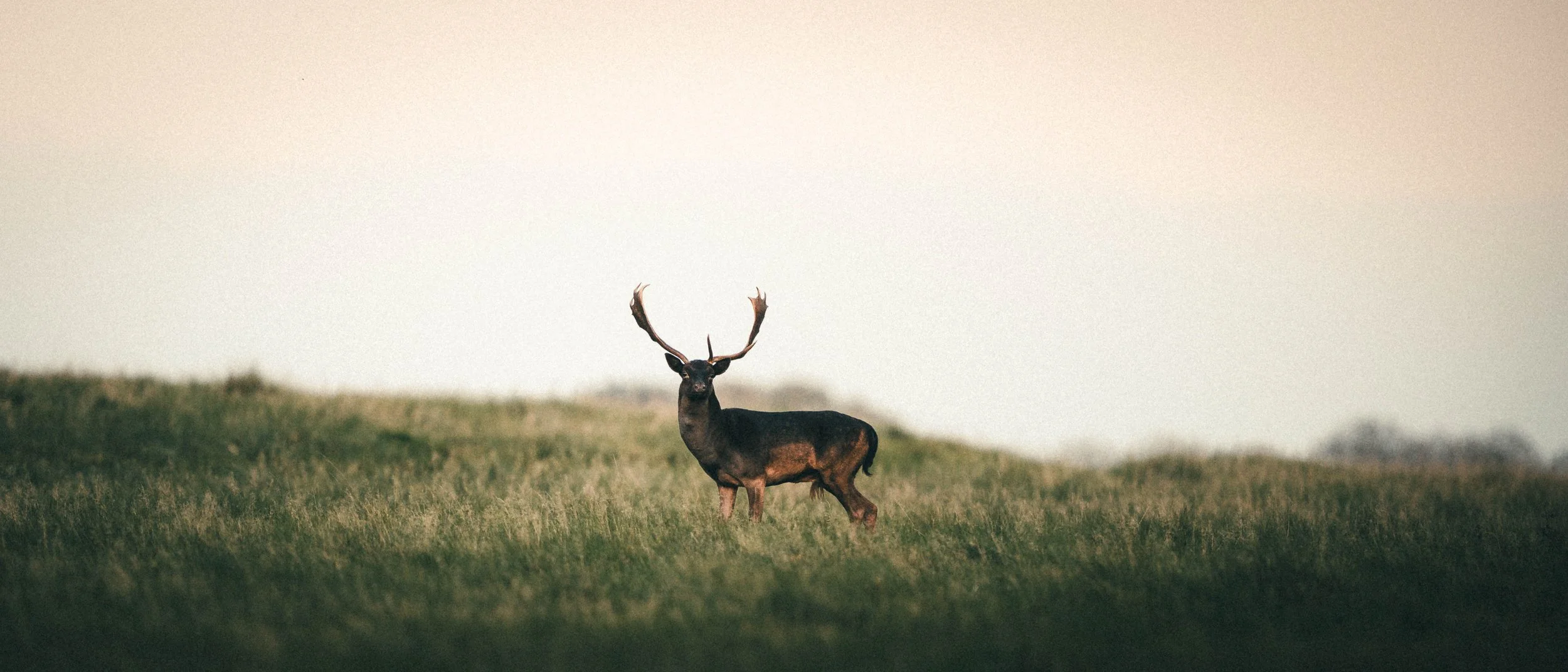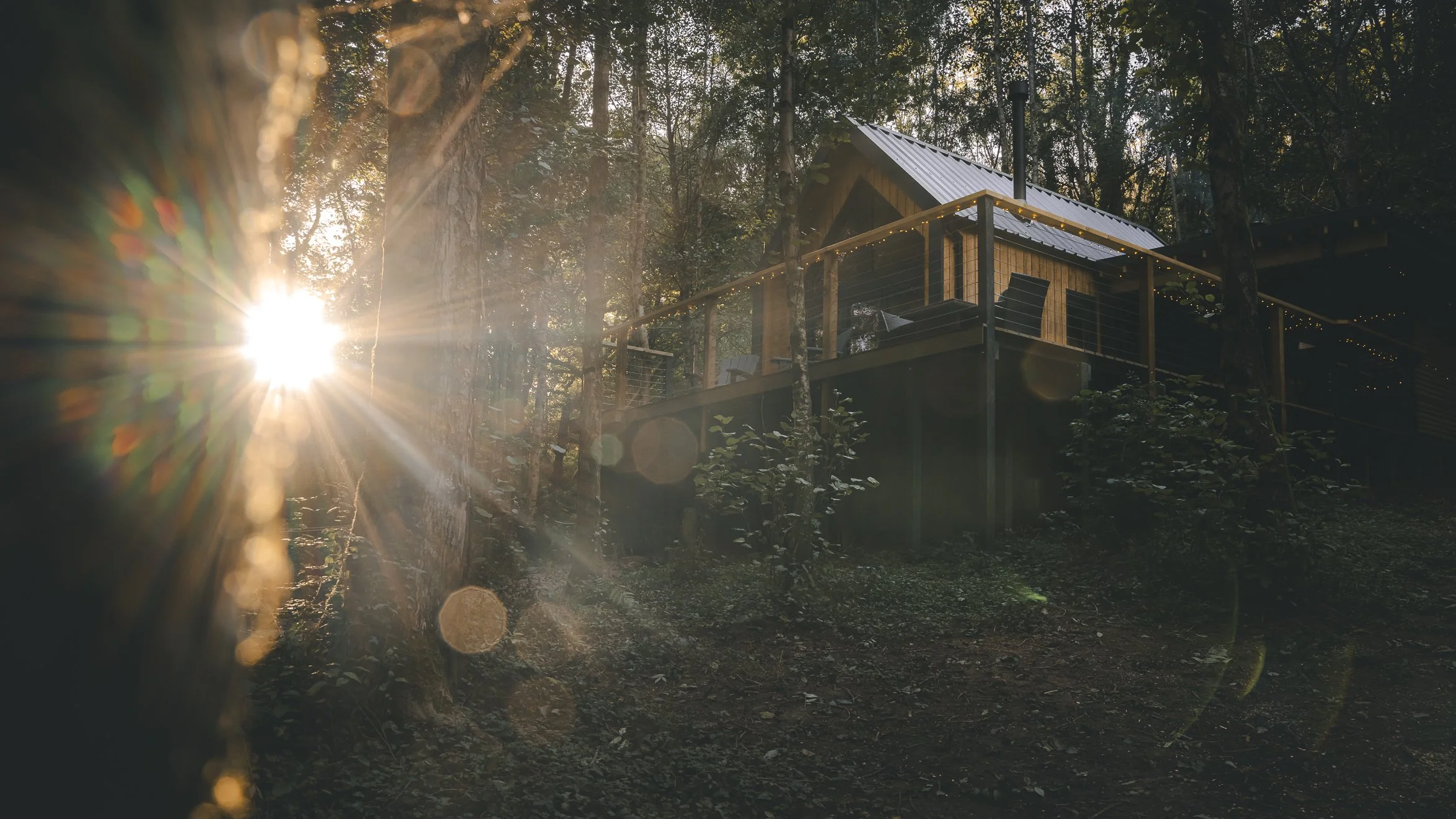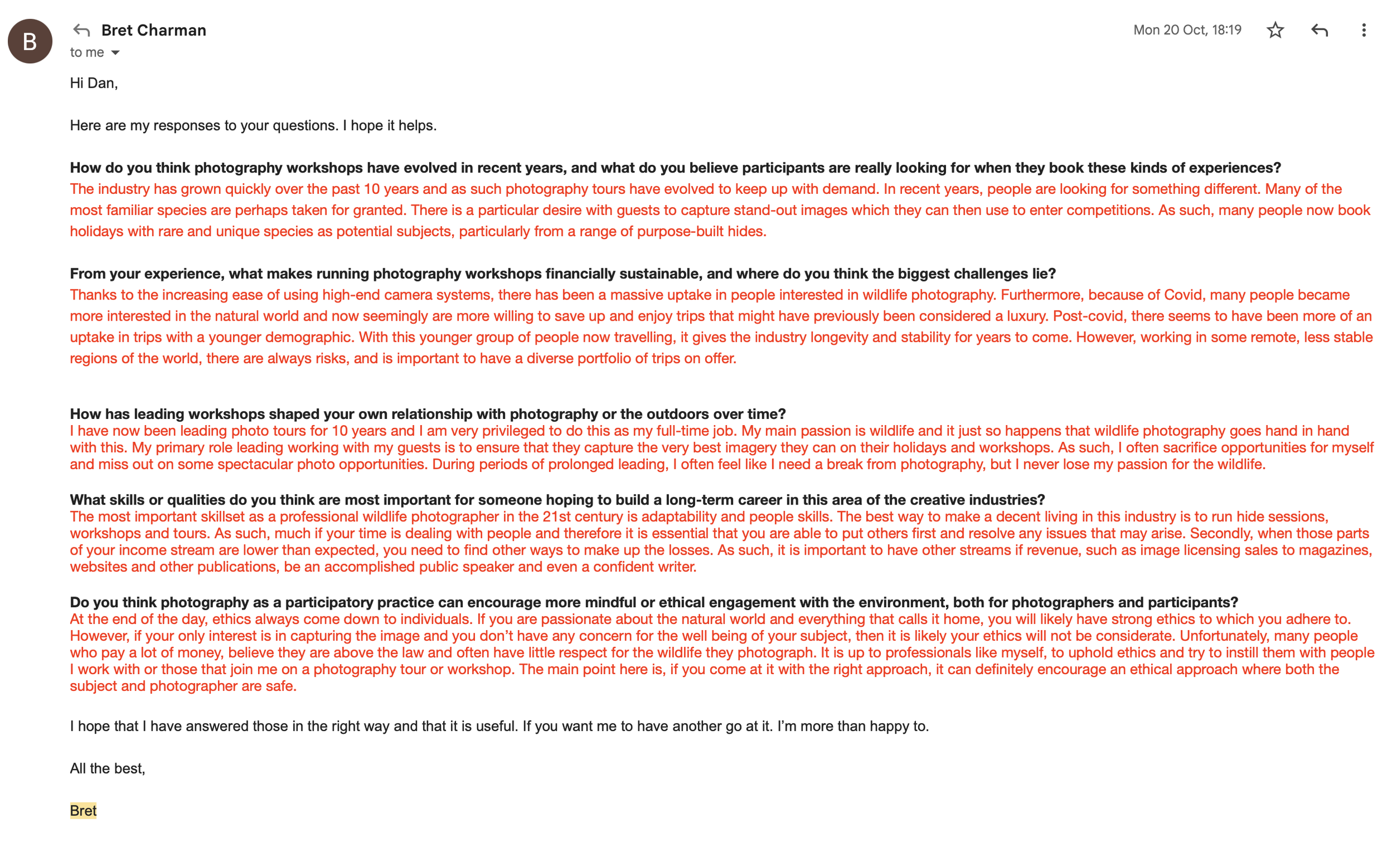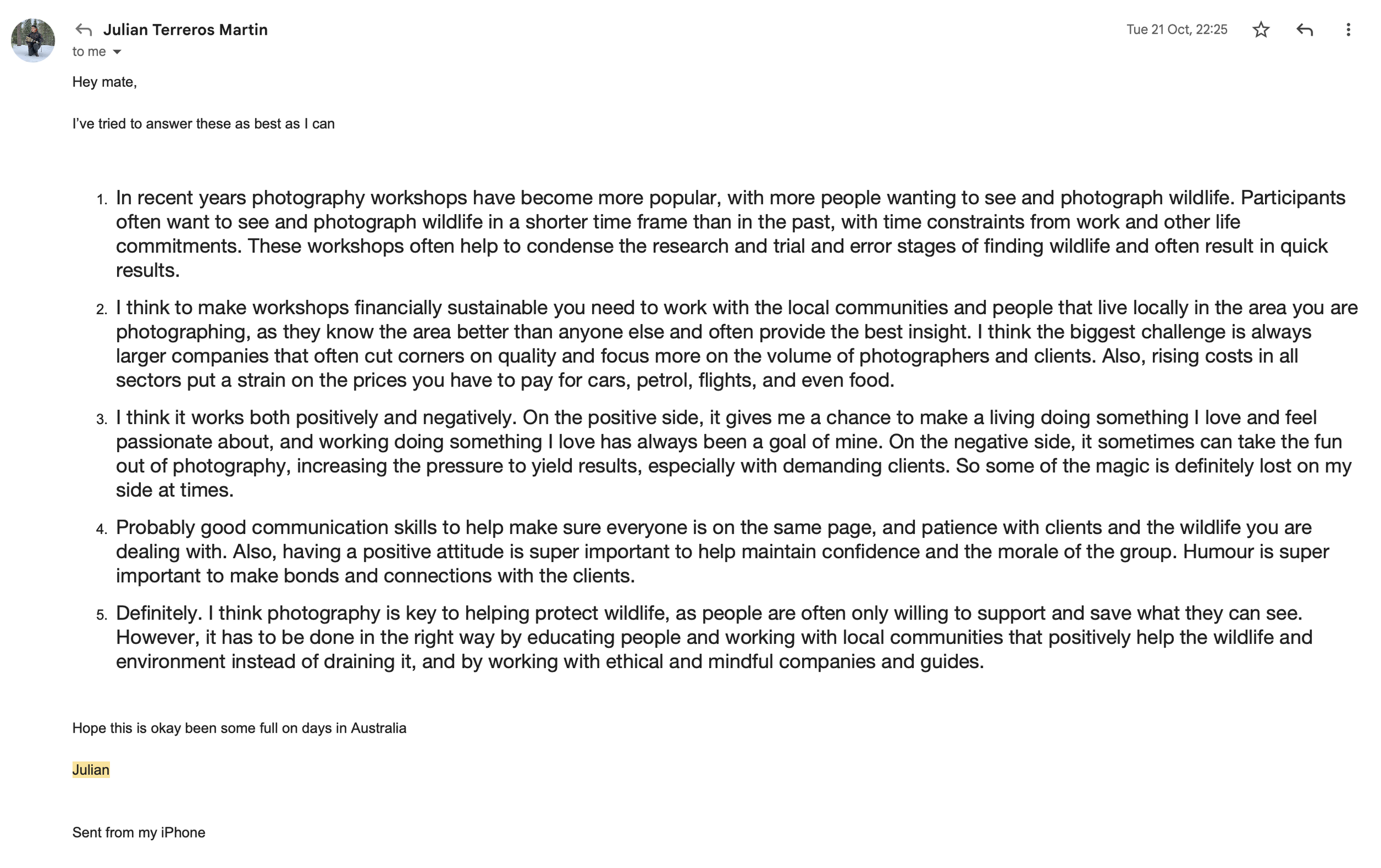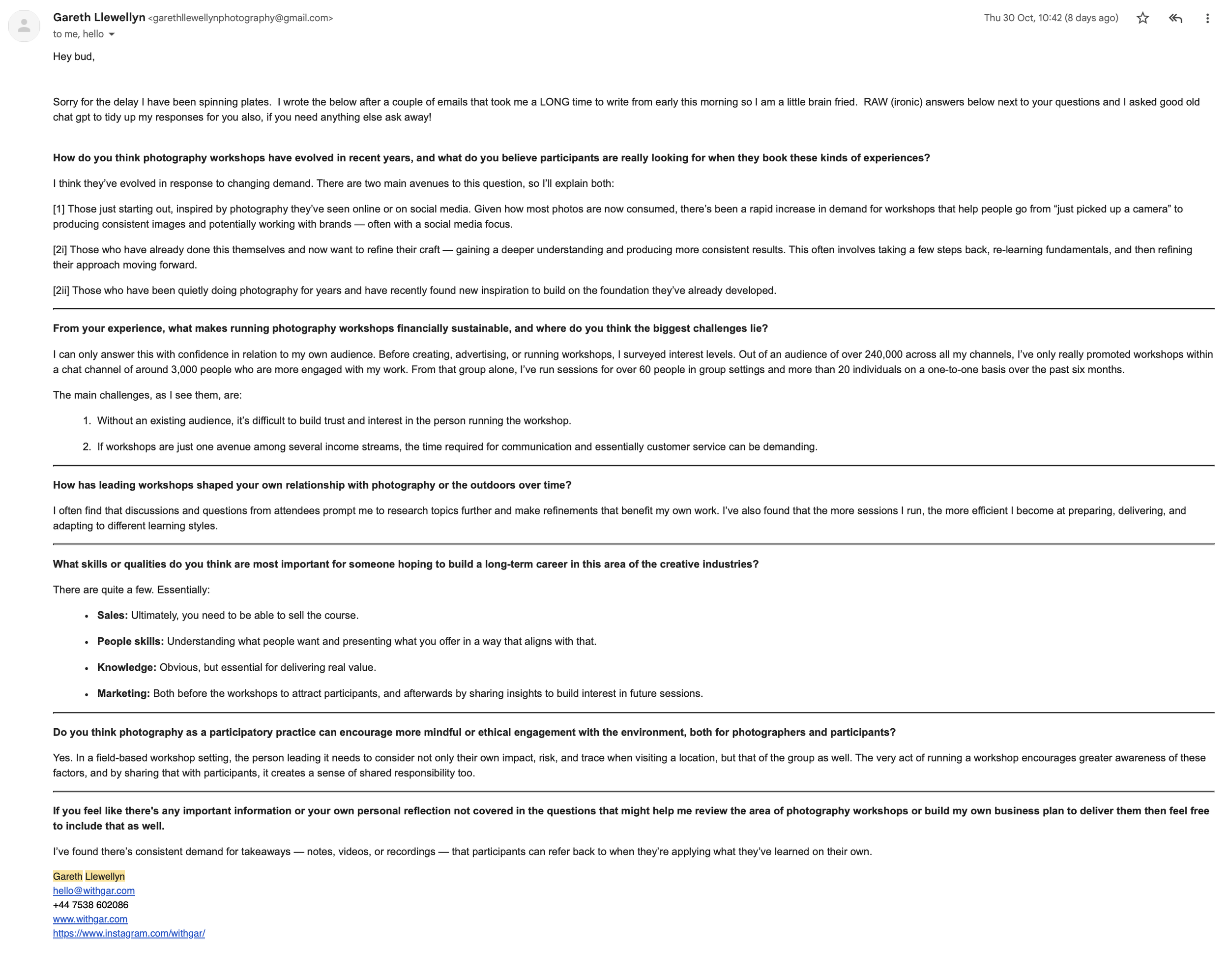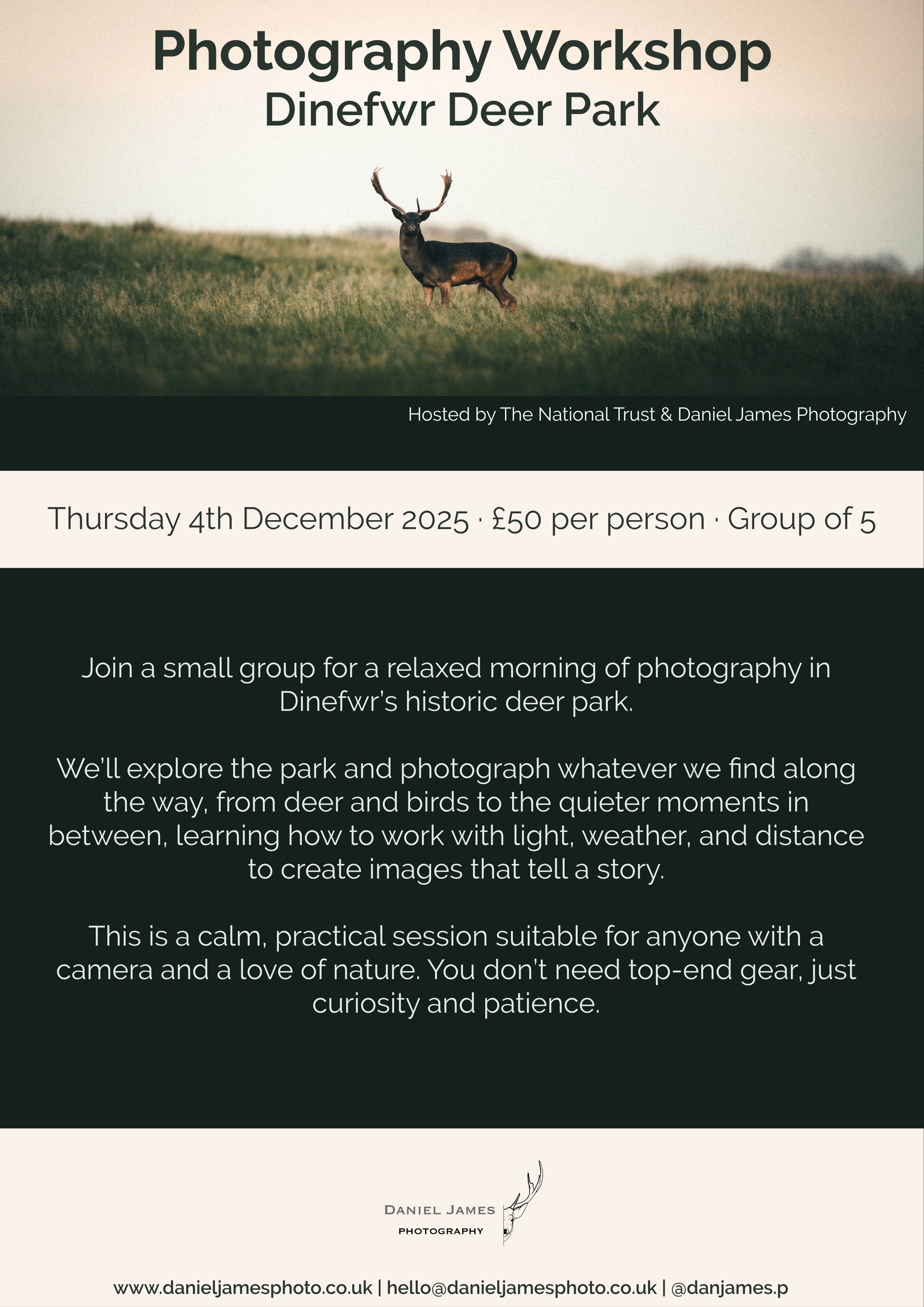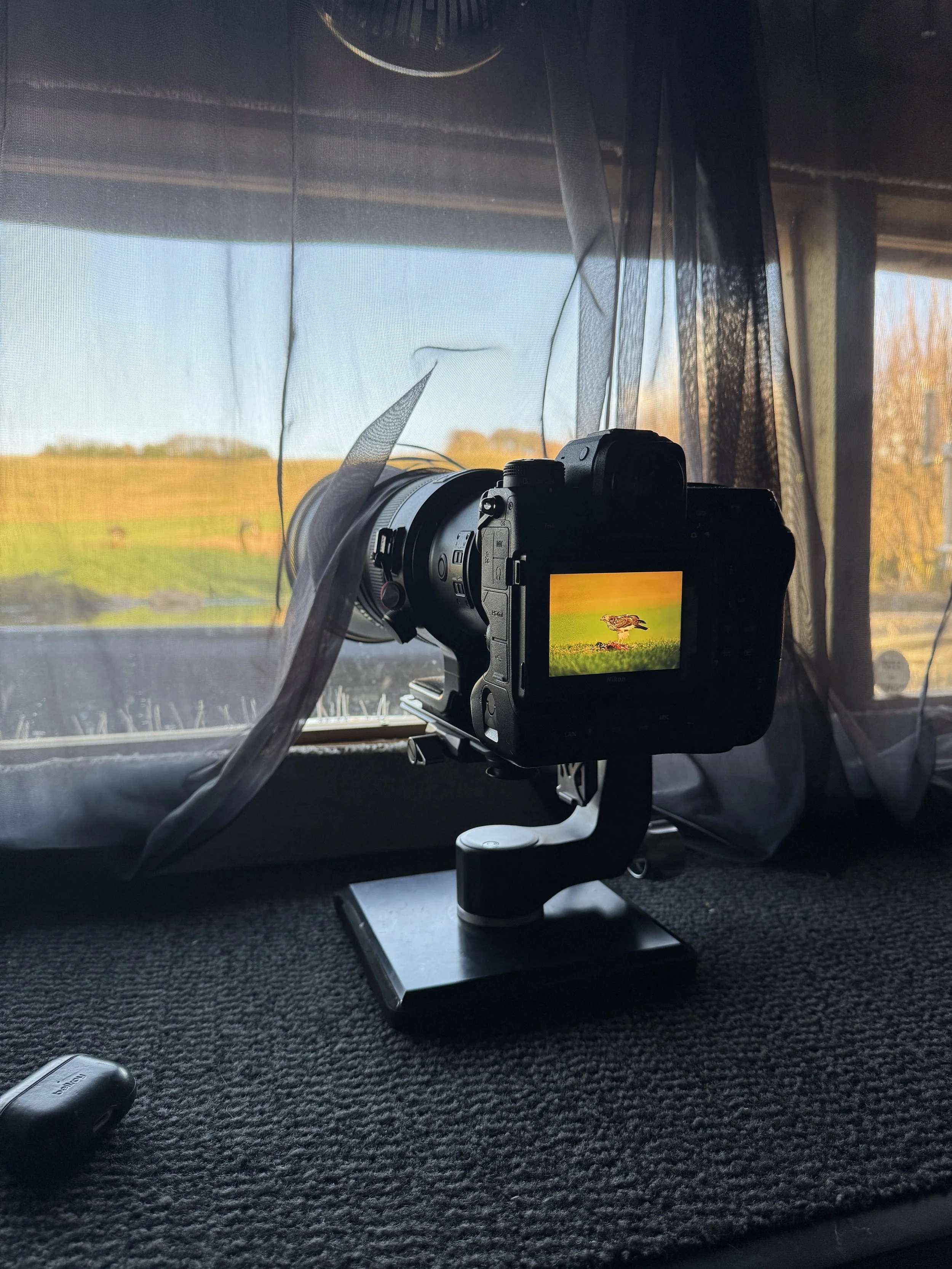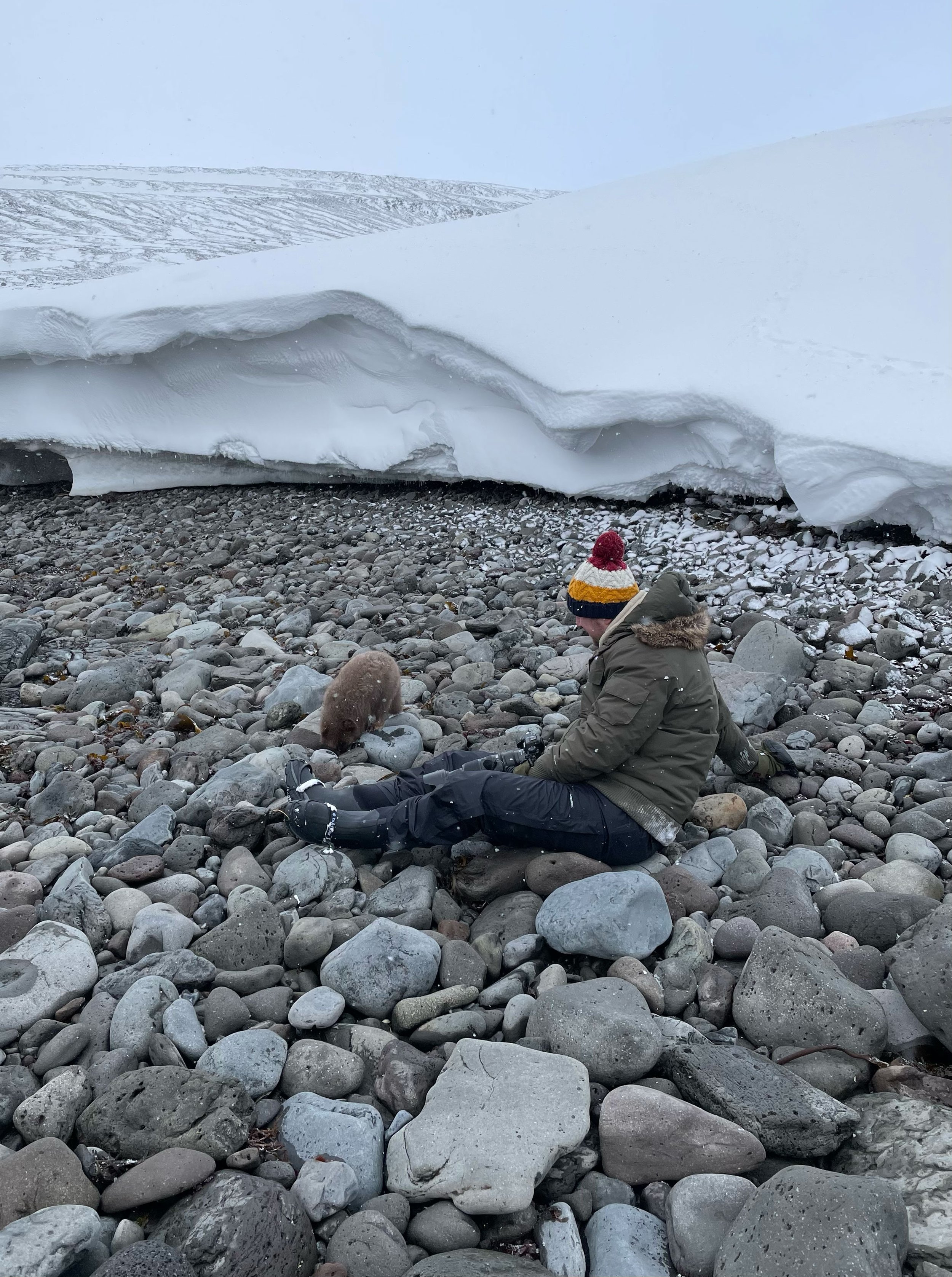Creative Industries Review - ADMA6008 - Daniel Phillips (2010958)
Introduction and Context
Modern life has created a growing distance between people and the natural world. As Ryan (2019) observes in Civilized to Death, society has become “wildly out of sync with the environment that shaped us,” this thinking is reflected in other lifestyle and philosophy books such as Heying and Weinstein’s A Hunter Gatherers Guide to the 21st Century (2021) and Harari’s Sapiens: A Brief History of Humankind (2014), and many of our modern struggles stem from that separation. Increasingly, people are searching for ways to slow down, notice, and feel connected again. Photography has become one of the most accessible and creative ways to do this. Through the process of looking closely, waiting for light, and paying attention to detail, photographers rediscover skills that once shaped human survival. These acts of observing, tracking, and responding to the environment are behaviours that feel instinctive and deeply rooted.
For me, this is where photography becomes more than an art form or a hobby. It becomes a way to return to something simple and meaningful. The experience of being in nature with a camera invites patience, awareness, and calm. Over time, I have realised that this connection is what I value most, and it is also what I want to share with others through my work, creating a life and a business that are built around this idea, earning a living in a way that supports my family and protects the natural environments that inspire my photography.
The business plan that supports this industry review outlines a gradual process of sustainable growth, beginning with small local photography workshops and one to one tuition. From there, I aim to develop partnerships with organisations such as the National Trust, Nikon, and Carmarthen Cameras. In the long term, my goal is to create a small retreat where people can stay, learn, and reconnect with nature through photography.
My approach to entrepreneurship is guided by the belief that creative work should exist in balance with life rather than compete with it. As Chouinard (2006) argues, business should “exist to support life, not consume it.” That view encapsulates exactly what I want to build: a creative and sustainable model that allows me to work with nature, support others, and protect what I love.
This review therefore explores the photography workshop industry through the relationship between creativity, sustainability, and lifestyle design. It uses academic research, professional insight, and first-hand experience to evaluate the challenges and opportunities that shape this area of the creative industries and to explain how these findings inform my own professional practice.
Industry and Current Trends
Photography workshops exist within what the Organisation for Economic Co-operation and Development (OECD, 2014) describes as creative tourism, defined as travel that enables participants to develop their creative potential through active participation. This form of tourism has grown rapidly in recent years as people increasingly seek experiences that are immersive and meaningful rather than purely recreational.
The Experiences Research Report (2019) identifies this shift as part of a broader global change in consumer behaviour, where individuals now prioritise memorable and participatory experiences over material possessions. Within this context, participants look for creative activities that are emotionally engaging as well as instructional. This trend also reflects the wider wellbeing economy, in which people place greater value on experiences that feel personal and purposeful.
The Great Britain Tourism Survey (VisitBritain and VisitEngland, 2025) highlights how domestic visitors increasingly seek opportunities to build authentic connections with both people and place. Similarly, Future Market Insights (2024) reports continuing growth in nature based and adventure tourism, noting that travellers are now motivated by opportunities for personal development and environmental awareness.
These trends directly support the objectives of my business plan. My photography workshops are designed to help participants feel present and connected, offering experiences that are educational yet restorative and encouraging them to slow down and appreciate the natural world. This pattern aligns with what the Guided Nature Experience (2019) describes as emotional and reflective engagement in outdoor activities. Photography naturally lends itself to this process because it demands patience, observation, and attention to subtle detail. Participants frequently describe a sense of mindfulness and calm that develops as they spend time observing nature (Guided Nature Experience, 2019), illustrating how photography can serve as both a creative and therapeutic activity.
However, it is important to acknowledge that the market has become increasingly competitive. Audiences now expect both professional standards and a personal, authentic approach. This shift reflects wider consumer behaviour trends in the UK tourism market, As Vertical Leap (2025) notes, travellers are increasingly motivated by experiences that feel authentic, creative and shareable, with digital storytelling and visual media playing a major role in how people choose and remember their experiences. Small providers must therefore uphold high levels of quality while preserving the individuality that distinguishes their work. Charman (2025) observed that building trust and audience loyalty is one of the greatest challenges when developing a new workshop business, and Terreros Martin (2025) added that sustainability depends on maintaining fair partnerships with guides and local communities. These comments illustrate that long term success is rooted in cooperation, reliability, and ethical practice rather than creative ability alone.
Economic factors further shape the industry. Rising travel and accommodation costs since the pandemic have made large scale experiences less viable for smaller operators. Many professionals now diversify their income through online courses, print sales, and brand collaborations (Charman, 2025). My own business plan follows this model by starting with smaller local workshops, supported by digital content and brand partnerships with Nikon and Carmarthen Cameras. This combination allows the business to maintain authenticity while remaining financially sustainable.
Despite these pressures, the Great Britain Tourism Survey (VisitBritain and VisitEngland, 2025) shows that domestic visitors remain motivated by experiences that foster creativity and connection. Future Market Insights (2024) predicts continued expansion within the nature based and adventure tourism markets, driven by travellers seeking personal growth and opportunities to disconnect from technology. The continued demand for nature based activities demonstrates that there is strong potential for independent businesses that prioritise quality, ethics, and sustainability. Photography workshops respond directly to these motivations by combining creativity, education, and reflection in a single experience. As Bret Charman (2025), who has guided both international and domestic wildlife photography trips for the last 10 years explained, “post-Covid, there seems to have been more of an uptake in trips with a younger demographic. With this younger group of people now travelling, it gives the industry longevity and stability for years to come.” This emerging trend highlights how the market is gradually expanding beyond the traditional older audience, presenting opportunities for workshops that integrate digital storytelling, social media engagement, and adventure based experiences to meet the expectations of this new generation of participants.
In summary, the photography workshop industry is characterised by growth, adaptability, and a growing sense of responsibility. It offers opportunities for creatives like myself, who can balance artistry with leadership and recognise that long term success depends as much on empathy and ethical practice as it does on creative skill.
Professional Practice and Requirements of the Field
Working professionally within the photography workshop sector requires far more than technical ability. Leaders must be creative, organised, and capable of communicating effectively with a diverse range of participants. Photography is both a personal and collective experience, and a good workshop leader must help others develop confidence, creativity, and awareness while ensuring safety and respect for the environment.
Independent providers like myself must balance professionalism with authenticity while working in unpredictable outdoor environments. My primary research supports this view. Bret Charman (2025) explained that success in guiding workshops depends on being able to prioritise others and remain calm under pressure. Julian Terreros Martin (2025), who is an independent international workshop provider noted that long term access and sustainability rely on building strong relationships with local communities, while Gareth Llewellyn (2025) - a social media influencer and photography educator, with an audience of over 240,000 people across all platforms - emphasised that trust and consistency are central to establishing a good reputation. Together, these insights highlight that success in this field depends as much on empathy, leadership, and ethical awareness as it does on technical skill.
My research also shows that professionalism in this field is closely linked to emotional intelligence and adaptability. Charman (2025) emphasised the value of calm and supportive leadership, explaining that resolving problems quickly and empathetically helps participants feel secure and valued. Terreros Martin (2025) described humour and patience as essential for creating a relaxed learning environment, while Llewellyn (2025) pointed out that sustainability and credibility come from consistency and genuine community involvement. These perspectives show that human connection is just as important as technical teaching.
The Guided Nature Experience (2019) supports these findings, describing the most successful outdoor experiences as those that encourage shared responsibility and awareness of impact. Workshop leaders must not only teach creative skills but also model ethical behaviour, ensuring that photography is conducted safely and with respect for wildlife and habitats. This involves understanding access laws, protecting fragile ecosystems, and promoting responsible environmental practice.
The Experiences Research (2019) report adds that participants increasingly look for activities that support personal growth and reflection. This means workshop leaders need to create learning environments that feel supportive and inclusive. From my own experience assisting in workshops, I have seen that participants respond best when leaders remain calm, clear, and encouraging, particularly when conditions are challenging. The Experience Development Workshop (TourismExperience.org, 2025) reinforces this, explaining that effective experience design relies on structure, emotional pacing and opportunities for reflection. These principles are highly relevant to photography workshops where creating a balance between technical instruction and personal connection helps participants feel engaged, supported and inspired.
Financially, the industry depends on flexibility and adaptability. Many professionals combine workshops with writing, speaking, or licensing their images, allowing them to maintain stability in a seasonal and unpredictable market. Terreros Martin (2025) explained that small scale workshops can often be more sustainable, particularly when combined with digital resources and local partnerships. My business plan follows this same model, focusing first on local growth and measured expansion.
Building a sustainable creative business also requires a clear identity and strong values. Neugebauer (2016) suggests that professionals benefit from developing a coherent visual and narrative identity that communicates integrity and expertise. In my own practice, this is reflected through a consistent photographic style, muted natural tones, and a focus on storytelling. I aim to communicate in an honest and grounded way that aligns with my personal values and the expectations of the photography community.
Professional practice in this field therefore relies on maintaining balance. It requires technical skill, empathy, and ethical leadership. Success is defined not by scale or profit, but by the ability to provide meaningful experiences that connect people to nature and inspire creativity.
Through attending workshops myself, I have also observed that some providers overlook essential aspects of adventure leadership. In several cases, there were no clearly defined learning outcomes or structured progression for participants, and basic safety measures were not always prioritised. The Guided Nature Experience (2019) highlights that successful outdoor activities depend on “clarity of purpose and a sense of being cared for,” reinforcing the importance of structured learning and visible leadership in workshop delivery. Similarly, the Experiences Research Report (2019) found that participants value experiences that are “personally meaningful and safely facilitated,” showing that creativity and safety must work together to build trust and wellbeing. I also noticed examples where leaders carried no first aid kit or failed to identify potential environmental hazards, despite Future Market Insights (2024) noting that travellers increasingly expect high ethical and safety standards from experience led tourism. These insights reaffirm the importance of integrating risk assessment, communication, and participant care into my own workshops.
This understanding of professionalism directly informs my business plan, which aims to build a sustainable model grounded in trust, ethical practice, and meaningful experiences. By combining clear creative values with structured financial planning, I can ensure that the business grows with purpose and remains consistent with the principles that define my work.
Audience, Media and Marketing Positioning
Understanding the target audience for photography workshops begins with recognising how creativity, wellbeing, and digital culture have merged to shape modern expectations. The Experiences Research Report (2019) identifies that audiences increasingly seek immersive and participatory experiences that allow personal expression. This reflects a broader cultural movement where creativity is linked to identity and wellbeing. Similarly, Future Market Insights (2024) notes that travellers are now motivated by opportunities for self-development and connection with nature, reflecting a shift towards experiences that feel restorative as well as educational.
For my business, this means positioning photography workshops as opportunities for reconnection and creativity rather than simple technical lessons. The Guided Nature Experience (2019) highlights that outdoor activities which include shared emotional engagement are the most memorable. Photography naturally supports this by encouraging patience, focus, and appreciation of the natural world. These are the emotional qualities that form the foundation of my brand. Bret Charman (2025) noted that after the pandemic, a younger demographic has become increasingly engaged with wildlife photography, contrasting with the traditional audience of older participants with higher expendable income. This shift highlights the importance of accessible pricing, flexible formats, and digital engagement to meet the expectations of a new generation of photographers.
Social media now plays a key role in building visibility and trust. Through my ongoing work on Instagram under @danjames.p, I have learned how consistent visual style and honest storytelling create a genuine connection with an audience. The Creative Economy Outlook (UNESCO, 2022) shows that digital platforms allow independent creatives to reach audiences that were once only accessible to large institutions. This has transformed how small creative businesses can promote themselves and share ideas. Gareth Llewellyn (2025) emphasised that building trust and interest is one of the greatest challenges for new workshop leaders, explaining that an existing audience and authentic communication are crucial to success.
My marketing approach follows this model of open and authentic communication. Instead of relying on traditional advertising, I aim to share behind the scenes stories, field notes, and participant experiences. This aligns with Jenkins’ (2006) concept of participatory culture, where audiences are not passive consumers but active participants in the creative process. Llewellyn (2025) also noted that participants increasingly value takeaway materials such as notes and recordings, which can be integrated into my marketing and teaching strategy to extend engagement beyond the workshop itself. By inviting people to engage with the journey rather than just the result, I can build a sense of community around my work.
The target audience for my workshops is defined more by mindset than by age or location. They are people who value creativity, balance, and the natural world. The Experiences Research Report (2019) describes them as experience driven learners who prefer authenticity and reflection to luxury or status. Julian Terreros Martin (2025) added that participants often seek meaningful experiences that help them feel present within limited time frames, reflecting the growing demand for concise yet impactful opportunities to connect with wildlife. They are motivated by curiosity, often using photography to disconnect from technology and to find calm.
Partnerships are also central to how I will position my brand. Future Market Insights (2024) notes that collaborations between small operators and trusted organisations are increasingly common in experience based tourism. These relationships build credibility and allow independent creatives to reach wider audiences. My plan to work with Nikon, the National Trust, and Carmarthen Cameras reflects this principle and supports a model of authenticity, collaboration, and trust.
Branding is another essential part of communicating professionalism and reliability. Neugebauer (2016) explains that creative professionals benefit from clear and consistent presentation that reflects their values. My visual identity is designed to communicate calmness, authenticity, and connection to nature. By maintaining consistency in tone, style, and storytelling, I can strengthen the emotional relationship between my work and its audience.
In summary, the photography workshop audience values creativity as part of wellbeing and seeks genuine, thoughtful experiences. Through careful branding, transparent communication, and ethical partnerships, my business will attract this audience and provide experiences that feel both personal and purposeful.
Professional Development and Skills Audit
This Personal Development Plan outlines my current position, long term goals, and the key areas I need to develop to achieve a sustainable balance between creativity, teaching, and business growth. It was written as a structured reflection on my progress over the past year, identifying how my academic learning, workshop experience, and personal responsibilities inform my professional practice.
The plan includes a detailed SWOT analysis and five year vision, focusing on the development of leadership, teaching, and brand strategy skills. Together, these form the foundation for my business plan and professional goals within the photography workshop industry.
This skills audit was completed alongside my Personal Development Plan to evaluate my current capabilities and identify areas for growth relevant to my business goals and creative practice. It highlights the combination of creative, educational, and entrepreneurial skills required to operate successfully within the photography workshop industry.
The audit demonstrates established strengths in photography, videography, business management, and risk awareness, while also recognising areas that require continued development such as marketing analytics, teaching accreditation, and advanced communication. Including adventure leadership, first aid, and learning theory ensures a holistic understanding of participant safety, engagement, and experience design.
By addressing these development areas, I aim to refine both the creative and professional aspects of my practice, ensuring that the business continues to evolve in line with industry expectations and my personal values.
Business Plan
My business plan outlines the strategy for developing a sustainable photography workshop business that connects creativity, education, and environmental awareness. It presents a three-phase growth model, beginning with local workshops and one-to-one tuition, progressing to national and international photography experiences, and ultimately establishing a dedicated retreat with glamping accommodation and wildlife hides.
The plan combines practical financial forecasting with creative entrepreneurship, aligning professional goals with personal values. It integrates sustainability, ethical tourism, and mindfulness as guiding principles, ensuring that each stage of growth remains consistent with the vision of fostering meaningful connections between people and nature.
This research document supports both my business plan and industry review. It brings together academic theory, professional insight, and primary research gathered through interviews and case studies. The document explores creativity, sustainability, and wellbeing within the photography and tourism sectors, analysing how these ideas influence modern expectations of experiential learning and nature-based workshops.
It also reflects on my own professional development, showing how learning theory, branding, and leadership can be applied to build a sustainable creative business. Together, these findings have informed every stage of my planning and continue to guide the direction of my practice.
Conclusion
The photography workshop industry represents a unique intersection of creativity, education, and sustainable tourism. It offers opportunities for meaningful entrepreneurship for those who can combine artistic vision with empathy and ethical awareness. Through research, planning, and professional reflection, I have developed a business model that aligns with both market trends and personal philosophy.
My approach integrates creative tourism theory with first hand insight from professionals working in the field. It also reflects my belief that photography can serve as a bridge between people and the natural world. By focusing on experiences that encourage mindfulness and connection, my workshops will contribute to both personal and environmental wellbeing.
Ultimately, this portfolio demonstrates how creative entrepreneurship can be built on authenticity, sustainability, and purpose. It is not only a plan for a business but a framework for a life that connects creativity, family, and nature in a way that feels balanced and meaningful for my personal goals.
Appendices:
Example of a CoalBunker lodge design at Great House Hideaways, illustrating the type of sustainable accommodation model referenced in the business plan.
Examples of other sites with Coalbunke lodges and high occupancy levels thought October to December 2025.
Email response from Bret Charman
Email response from Julian Terreros-Martin
Email response from Gareth Llewellyn
Positive feedback from the mother of a participant at one of my workshops.
Example poster for a workshop I’m collaborating with the National Trust on.
at UK Wildlife Hides’ Raptor Hide - https://www.wildlife-photography-hides.co.uk/the-raptor-hide.aspx
Photographing Arctic Foxes with Wildlife Worldwide - https://www.wildlifeworldwide.com/group-tours/arctic-fox-photography
Bibliography:
Aigas Field Centre. (2025) Nature Photography Workshops and Learning Holidays. [online] Available at: https://www.aigas.co.uk [Accessed 3 Nov. 2025].
Apex Expeditions. (2025) Wildlife Travel and Guided Photography Tours. [online] Available at: https://www.apex-expeditions.com [Accessed 3 Nov. 2025].
Bartlett, S. (2023) The Diary of a CEO: The 33 Laws of Business and Life. London: Penguin Business.
Barthes, R. (1980) Camera Lucida: Reflections on Photography. New York: Hill and Wang.
Bourne Wildlife Hides. (2025) Wildlife Photography Hides to Book. [online] Available at: https://www.wildlife-photography-hides.co.uk [Accessed 3 Nov. 2025].
Bret Charman. (2025) Personal communication with Daniel Phillips, January 2025.
Chouinard, Y. (2006) Let My People Go Surfing: The Education of a Reluctant Businessman. London: Penguin Books.
Coalbunker. (2025) Luxury Glamping Pod Manufacturer and Supplier. [online] Available at: https://www.coalbunker.co.uk [Accessed 3 Nov. 2025].
Elmley Nature Reserve. (2025) Stay at Elmley: Nature Reserve Retreats. [online] Available at: https://www.elmleynaturereserve.co.uk [Accessed 3 Nov. 2025].
Experiences Research Report. (2019) Experiences Research Report. [PDF] London: VisitBritain.
Ferriss, T. (2007) The 4-Hour Work Week: Escape the 9–5, Live Anywhere and Join the New Rich. New York: Crown Publishing.
Future Market Insights. (2024) Glamping Market Forecast 2024–2032. [online] Available at: https://www.futuremarketinsights.com/reports/glamping-market [Accessed 3 Nov. 2025].
Future Market Insights. (2024) Nature-Based and Adventure Tourism Market Outlook 2024–2034. [online] Available at: https://www.futuremarketinsights.com [Accessed 3 Nov. 2025].
Gladwell, M. (2008) Outliers: The Story of Success. New York: Little, Brown and Company.
Gladwell, M. (2019) Talking to Strangers: What We Should Know About the People We Don’t Know. London: Allen Lane.
Grand View Research. (2023) UK Wildlife Tourism Market Size and Outlook 2023–2030. [online] Available at: https://www.grandviewresearch.com/horizon/outlook/wildlife-tourism-market/uk [Accessed 3 Nov. 2025].
Great House Hideaways. (2025) Ty Nant Luxury Woodland Lodge. [online] Available at: https://greathousehideaways.co.uk/ty-nant/ [Accessed 3 Nov. 2025].
Guided Nature Experience. (2019) Guided Nature Experience: Research Summary. [PDF] Available at: https://www.guidednatureexperience.com [Accessed 2 Nov. 2025].
Harari, Y.N. (2014) Sapiens: A Brief History of Humankind. London: Vintage.
Heying, H. and Weinstein, B. (2021) A Hunter-Gatherer’s Guide to the 21st Century: Evolution and the Challenges of Modern Life. New York: Portfolio.
Holiday, R. (2016) Ego Is the Enemy. London: Penguin Portfolio.
Jenkins, H. (2006) Convergence Culture: Where Old and New Media Collide. New York: New York University Press.
Julian Terreros Martin. (2025) Personal communication with Daniel Phillips, January 2025.
Kim, W.C. and Mauborgne, R. (2005) Blue Ocean Strategy: How to Create Uncontested Market Space and Make the Competition Irrelevant. Boston: Harvard Business Review Press.
Llandeilo Glamping. (2025) Pond View Lodges. [online] Available at: https://llandeiloglamping.co.uk [Accessed 3 Nov. 2025].
Llewellyn, G. (2025) Personal communication with Daniel Phillips, January 2025.
Neugebauer, J. (2016) Making the Most of Your Placement. London: Sage Publications.
Nichols, B. (2017) Introduction to Documentary. 3rd ed. Bloomington: Indiana University Press.
Organisation for Economic Co-operation and Development (OECD). (2014) Tourism and the Creative Economy. Paris: OECD Publishing.
Pausch, R. and Zaslow, J. (2008) The Last Lecture. New York: Hyperion.
Phillips, D.J. (2022) Leadership in Adventure and Outdoor Education. University of Wales Trinity Saint David.
Phillips, D.J. (2022) Kolb’s Learning Theory: A Reflection on Personal Practice in an Outdoor Experience. University of Wales Trinity Saint David.
Polaris Market Research. (2024) UK Glamping Market Share, Size, Trends, and Industry Analysis Report 2024–2032. [online] Available at: https://www.polarismarketresearch.com/press-releases/uk-glamping-market [Accessed 3 Nov. 2025].
Ryan, C. (2019) Civilized to Death: The Price of Progress. New York: Avid Reader Press.
Skeggs Photography. (2025) Path of the Puma. [online] Available at: https://www.skeggsphotography.com [Accessed 3 Nov. 2025].
TourismExperience.org. (2025) Experience Development Workshop (Resource Hub, Chapter 1). [online] Available at: https://www.tourismexperience.org/downloads/English%20content/Resource%20hub/Chapter%201/experience-development-workshop.pdf [Accessed 3 Nov. 2025].
Thurston, G. (2020) Journeys in the Wild: The Secret Life of a Cameraman. London: Cassell Illustrated.
UNESCO. (2022) Creative Economy Outlook 2022: Trends in International Trade in Creative Industries. Paris: UNESCO Publishing.
Vertical Leap. (2025) UK Holiday Trends: What’s Shaping the Future of Travel? [online] Available at: https://www.vertical-leap.uk/blog/uk-holiday-trends-whats-shaping-the-future-of-travel/ [Accessed 3 Nov. 2025].
VisitBritain and VisitEngland. (2025) Great Britain Tourism Survey 2025. London: VisitBritain.
Wildlife Worldwide. (2025) Wildlife Travel and Guided Photography Tours. [online] Available at: https://www.wildlifeworldwide.com [Accessed 3 Nov. 2025].

